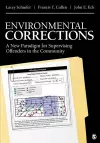
Environmental Corrections
3 authors - Paperback
£84.00
Lacey Schaefer is Lecturer in the School of Criminology and Criminal Justice at Griffith University. She received her Ph.D. in Criminal Justice from the University of Cincinnati. She previously worked as a Research Fellow for the University of Cincinnati Policing Institute and in the Australian Research Council’s Centre of Excellence in Policing and Security, exploring the impact of community efforts on crime-reduction interventions and the disruption of offending pathways. Professor Schaefer’s publications apply criminological theory to community and correctional interventions, examining the intersection of research and practice. In 2013, she coauthored Monitoring Offenders on Conditional Release in the Problem-Oriented Guides for Police series. Among other forums, her writings have appeared in the Journal of Research in Crime and Delinquency and The Prison Journal. Her current research explores the individual and community predictors of crime-controller actions, outlining the processes associated with crime-opportunity reduction. Francis T. Cullen is Distinguished Research Professor Emeritus and Senior Research Associate in the School of Criminal Justice at the University of Cincinnati, where he also holds a joint appointment in sociology. He received a Ph.D. (1979) in sociology and education from Columbia University. Professor Cullen has published over 300 works in the areas of criminological theory, corrections, white-collar crime, public opinion, and the measurement of sexual victimization. He is author of Rethinking Crime and Deviance Theory: The Emergence of a Structuring Tradition and is coauthor of Reaffirming Rehabilitation, Corporate Crime Under Attack: The Ford Pinto Case and Beyond, Criminology, Combating Corporate Crime: Local Prosecutors at Work, Unsafe in the Ivory Tower: The Sexual Victimization of College Women, Correctional Theory: Context and Consequences. Environmental Corrections: A New Paradigm for Supervising Offenders in the Community, and Communities and Crime: An Enduring American Challenge. He also is coeditor of Criminological Theory: Past to Present—Essential Readings, Taking Stock: The Status of Criminological Theory, The Origins of American Criminology, the Encyclopedia of Criminological Theory, The Oxford Handbook of Criminological Theory, The Oxford Handbook of White-Collar Crime, The American Prison: Imagining a Different Future, Challenging Criminological Theory: The Legacy of Ruth Rosner Kornhauser, Sisters in Crime Revisited: Bringing Gender Into Criminology, Delinquency and Drift Revisited: The Criminology of David Matza and Beyond, Deterrence, Choice, and Crime: Contemporary Perspectives. Professor Cullen is a Past President of the American Society of Criminology and of the Academy of Criminal Justice Sciences. In 2010, he received the ASC Edwin H. Sutherland Award. In 2013, he was honored by his alma mater, Bridgewater State University, with a Doctorate in Public Service. John E. Eck is Professor of Criminal Justice at the University of Cincinnati, where he teaches police effectiveness and crime prevention. He received his bachelor’s and master’s degrees from the University of Michigan, and his doctorate from the University of Maryland’s Department of Criminology. Professor Eck has conducted research into police operations since 1977, and served as the Research Director for the Police Executive Research Forum (PERF). At PERF, he spearheaded the development of problem-oriented policing throughout the U.S. He was also the Evaluation Coordinator for Law Enforcement at the Washington/Baltimore High Intensity Drug Trafficking Area, and a consultant to the London Metropolitan Police, Royal Canadian Mounted Police, Police Foundation, and other organizations. His research has focused on the development of problem-oriented policing, police effectiveness, crime patterns, and crime prevention. He is particularly interested in concentrations of crime in very small areas, how these form, and what can be done to prevent crime at these places. Professor Eck was a member of the National Academy of Science’s Committee to Review Research on Police Policy and Practices. He is the coauthor (with Ronald Clarke) of Crime Analysis for Problem-Solvers: In 60 Small Steps, as well as the coauthor of many publications on problem-oriented policing, crime mapping, crime prevention, and problem places. He is a coauthor of the forthcoming Place Matters: Criminology for the 21st Century (Cambridge University Press).